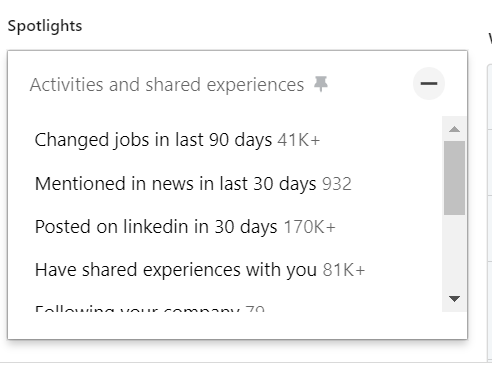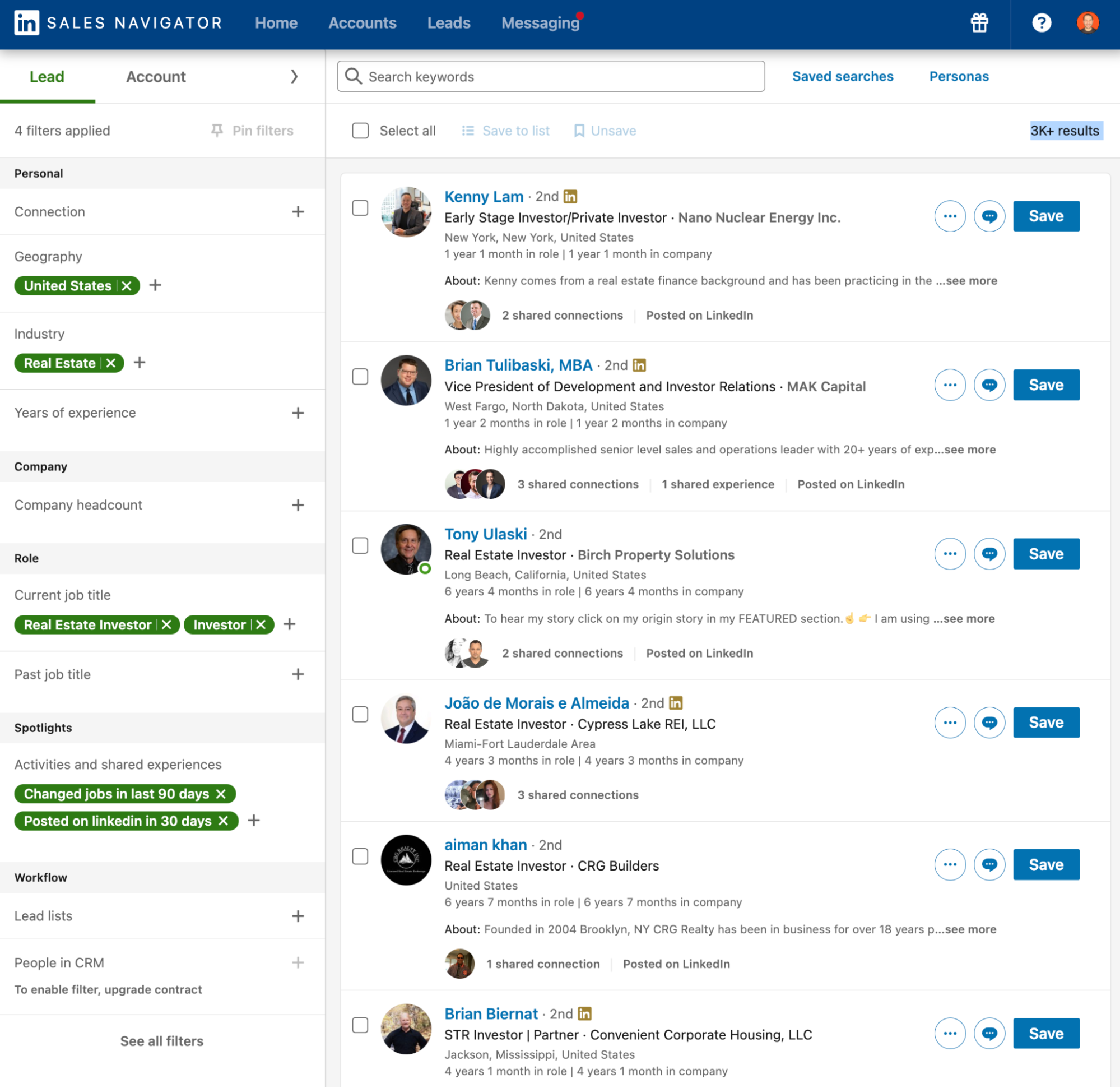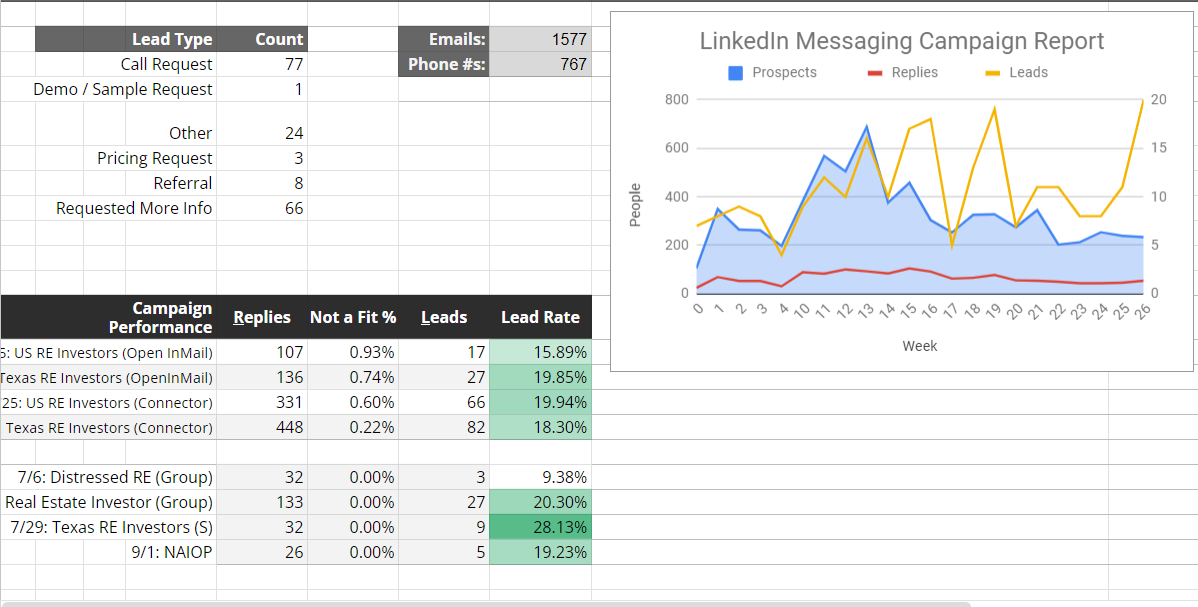In the competitive world of real estate, generating quality leads is crucial for success. Real estate professionals need to continuously attract potential clients to grow their businesses, and the looming threat of a recession in 2023 is certainly putting a damper on many people’s spirits. Even under normal circumstances, lead generation can be a daunting task for many real estate professionals. This is especially when coming up with a solid content strategy that can help attract and retain prospects. That’s why we’re swooping in to share what we know about lead generation for real estate!
Can LinkedIn Offer the Best Lead Generation for Real Estate?
Yes! In fact, LinkedIn is a great place to start within the real estate industry. We know this because of the high number of active users that show up when looking on Sales Navigator. Whether you’re searching for realtors, real estate professionals, or someone to offer loans, LinkedIn is the place to be, especially if your focus is B2B.
Here are a few scenarios that are commonly successful among our B2B clients:
- Offering real estate investment opportunities to investors or investing groups
- Recruiting for realtors to work at a brokerage
- Mortgage brokers offering partnership to real estate brokers
- Mortgage brokers offering loans to real estate investors
Are you still not sure if your audience is active on LinkedIn? Here’s a trick to know for sure:
- Fill out any other filters for your audience
- Find the “Spotlights” filter
- Look for “Changed jobs in last 90 days” and “Posted on LinkedIn in 30 days”
Changed job and Posted on LinkedIn are the filters that show us *active* users. Compare the without Spotlights number and with the Spotlights number. That is an estimate of how active your prospects are.
We ran this test to see how many users in the real estate industry were “active” in the United States. Of the 3M prospects that showed up in our search, only 41k changed jobs in the last 90 days and 170k posted on LinkedIn in 30 days.

Here’s an example on how to find real estate investors in the US:

Tips and Tricks
When it comes to marketing real estate services to businesses, the right approach is critical. Here’s a list of 10 quick tips to help you effectively market your real estate services:
- Identify your target audience: Determine the type of businesses that are likely to need your real estate services, such as startups, established businesses, or corporations. We know that Sales Navigator is great for outreach, but it can help you figure out your target audience as well. Simply plug in your information and see who comes up!
- Build relationships with industry leaders: Attend networking events and conferences to meet and connect with influential figures in your target industry. Building strategic partnerships with industry leaders can help position you as a trusted and knowledgeable source in the real estate industry.
- Leverage LinkedIn: LinkedIn is a powerful platform for B2B marketing. Utilize the platform to showcase your expertise in real estate. Connect with decision-makers in target companies. Share informative content that’s relevant to your target audience.
- Use case studies: Develop case studies that showcase your past successes in helping businesses find the right real estate solutions. Case studies can be a powerful tool in convincing potential B2B clients to choose you over competitors. (We have an example below!)
- Offer value-added services: Consider offering value-added services such as consulting, market research, or financial analysis to differentiate yourself from competitors and attract more B2B clients.
- Build a strong online presence: Develop a professional website that highlights your real estate services and showcases your expertise. Consider creating a blog where you can share informative content that’s relevant to your target audience. It also never hurts to post regularly, so here are a couple post ideas for you if you get stuck: 5 Things to Post on LinkedIn to Stay Top of Mind
- Participate in industry events: Attend industry events, such as trade shows or business conferences, to connect with potential B2B clients and stay up-to-date on industry trends and news.
- Use targeted advertising: Consider using targeted advertising on platforms like LinkedIn or Google AdWords to reach businesses in your target market. (Need some LinkedIn Ads? We got you covered.)
- Develop a referral program: Encourage satisfied B2B clients to refer other businesses to you by developing a referral program. Offer incentives or discounts to clients who refer new business to you.
- Nurture leads with email marketing: Develop targeted email campaigns to nurture leads and build relationships with potential B2B clients. Use email to share informative content, highlight new services or properties, or offer value-added services like market research or consulting. Check out our post on how to start a prospecting conversation if you need a place to begin!

Real Estate Case Study
Let’s take a look at a client of ours who did well: a mortgage broker, who we’re going to name “AS.”
AS came to us with the goal of offering loans to multifamily investors on LinkedIn, and he remains one of our most successful clients. Over the lifetime of his campaign, he managed to find 241 leads. 77 of those leads wanted to get on a phone call with him.
Here’s what we did well:
- AS joined groups that matched his audience, and LinkedIn let him message those people without burning credits, thereby boosting his outreach. (Here’s a tip on how to find groups).
- He established a very clear audience (Investors in real estate), and that audience was active on LinkedIn.
- We wrote effective scripts for him, including a starting question that sparked interest among his prospects and a call to action that would lead prospects to a phone call.
- He followed up with his leads regularly!

The Bottom Line
The bottom line is that despite economic uncertainties, the best lead generation strategies for real estate professionals remain consistent: providing value through informative and engaging content, building strong relationships with prospects, and leveraging the power of social media and other digital marketing tools to reach a wider audience.
By implementing these strategies, real estate professionals can position themselves for success regardless of what the future holds.
